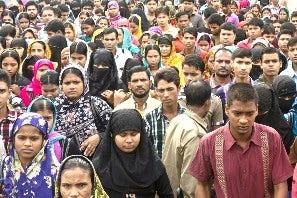
December 16, 2012 will in the foreseeable future be remembered as the day in which six men savagely gang raped a 23-year old female student on a bus in New Delhi. The young woman died from her injuries 13 days later. The event shocked the nation and sparked unprecedented uprisings in the Indian capital and across the country. It put the international spotlight on India and reminded us that violence against women remains a leading cause of female mortality worldwide.
Today, on the one-year anniversary of what is simply referred to as the “Delhi Rape”, we are compelled to pause and reflect. Four men were sentenced to death for the crime in September – did this bring closure? Beyond the protests and public appeals for change, has there been meaningful change in India?

“The grooming of young men to have a feeling of entitlement by Indian parents breeds a sense of masculinity and male privilege. Son preference simultaneously erodes the possibility of respect for women, as girls are seen as unwanted or burdensome. Such inequalities produce the very hatred against women in the public arena that we are witnessing throughout the country. When women do not cower or display their vulnerability — thereby inviting the protection of the virile Indian male — what follows is a sense of emasculation and aggrievement on the part of these men.”
Stopping gender violence in India thus requires serious collective introspection by all Indians – both men and women – who through parenting and other actions and behaviors, unconsciously produce the very men who perpetuate these egregious crimes.
Here at the World Bank, the Delhi Rape touched many of us at a very personal level.
The case caught the immediate attention of then VP Isabel Guerrero who had been posted to Delhi as India Country Director. Her deep concern spawned an urgent response in the Bank that one-year later has resulted in a regional multi-faceted program in South Asia focused on research, technical support to projects, and a new Innovation Lab that will test interventions on gender violence.
The program was launched with a first-ever conference – Joining Forces to Overcome Violence Against Women, and youth Violence Against Women Hackathon in Kathmandu in June 2013. The latter brought together young tech savvy Nepalese to develop ICT solutions to counter gender violence..
In July, the Bank initiated a comprehensive regional study on Gender Based Violence in South Asia to be presented at the 2014 WB/IFM Spring Meetings. More recently, to mark Elimination of Violence Against Women Day, the region hosted an online chat What is the role of men in ending violence against women? to discuss this oft-overlooked question; it is first of a host of initiatives planned to understand what prompts men to commit acts of violence.
For the Bank, these are important first steps but they offer us a glimmer of hope that one day the pervasive nature of violence against women will be a thing of the past.


Join the Conversation